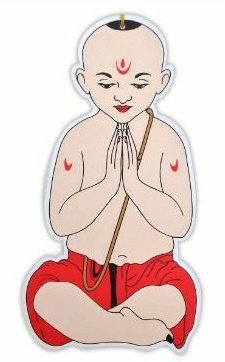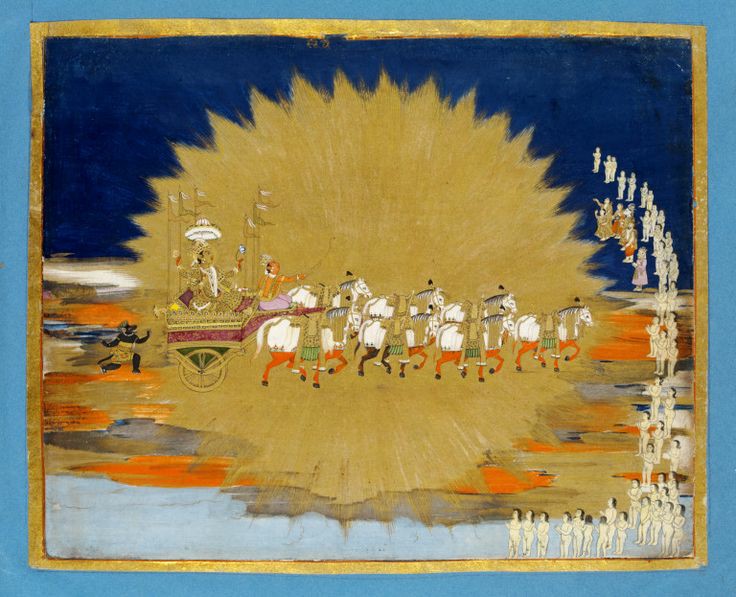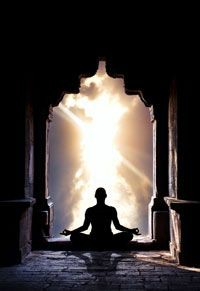
II Sri Adi Śaṅkarācārya - श्री आदि शङ्कराचार्य II
Sōpānaṁ : 6 Childhood
प्रकृतिविकृतिभिन्नः शुद्धबोधस्वभावः
सदसदिदमशेषं भासयन्निर्विशेषः।
विलसति परमात्मा जाग्रदादिष्ववस्था-
स्वहमहमिति साक्षात्साक्षिरूपेण बुद्धेः॥ १३५॥
{Vivekacūḍāmaṇi : Verse 135}
#Thread

Sōpānaṁ : 6 Childhood
प्रकृतिविकृतिभिन्नः शुद्धबोधस्वभावः
सदसदिदमशेषं भासयन्निर्विशेषः।
विलसति परमात्मा जाग्रदादिष्ववस्था-
स्वहमहमिति साक्षात्साक्षिरूपेण बुद्धेः॥ १३५॥
{Vivekacūḍāmaṇi : Verse 135}
#Thread


What appears as jivatma is only a superimposition on paramatma, like a snake on a rope. Just as the rope becomes clearly visible in light, the Nitya Buddha buddha Mukta swarupa - Eternal, Pure, Awackened, Ever-free Self - is clearly experienced in enquiry.The most unfortunate
predicament of man is to forget the truth that is so clear & obvious. The consequences of this forgetfulness is samsara, comprising birth & death. The only way of putting and to this misery is attaining the knowledge of the Self. This is the Upanishadic revelation. It is to
proclaim this truth that Bhagavan Sankara descended upon the earth.
All the sacred rites like 'jatakarma' ( purificatory ritual after child birth ), 'bahirnishkramana' ( taking the child out of the house for the first time ) & 'annaprasana' ( rice giving ceremony ) were performed
All the sacred rites like 'jatakarma' ( purificatory ritual after child birth ), 'bahirnishkramana' ( taking the child out of the house for the first time ) & 'annaprasana' ( rice giving ceremony ) were performed

for the child as per the Vedic injunctions. The boy grew up in an atmosphere of Bhakti, Jnana and Vedic culture.
Sivaguru observed that by the age of 3, the child had grasped all the traditional shastras.
Sivaguru observed that by the age of 3, the child had grasped all the traditional shastras.

Initiation into Gayatri & Vedic studies :
Sivaguru decided to perform sankaras upanayanam at the age of five. One day Sivaguru beckoned Sankara to his side.
Sivaguru : Sankara ! We wish to initiate you into the Upasana of Gayatri through upanayanam.‘Upa’ means nearby ; ‘nayanam’
Sivaguru decided to perform sankaras upanayanam at the age of five. One day Sivaguru beckoned Sankara to his side.
Sivaguru : Sankara ! We wish to initiate you into the Upasana of Gayatri through upanayanam.‘Upa’ means nearby ; ‘nayanam’
means to lead forward. After the ceremony, you must got o a guru & study the Vedas.
Sankara : Father, does not upanayanam mean ‘ another eye’ ?
Sivaguru : Yes. But dear son, what does it mean ?
Sankara : with the senses we perceive this world, and not the Reality. The power of
Sankara : Father, does not upanayanam mean ‘ another eye’ ?
Sivaguru : Yes. But dear son, what does it mean ?
Sankara : with the senses we perceive this world, and not the Reality. The power of
vision awakened through ‘tapas’ is the eye of ‘sraddha’ & once it is awakened the beauty of the Self is recognised. The physical eye shows the world to us. The Upanishadic eye reveals the ‘Atman’, the Self. While the sun gives light to the physical eyes, the Guru is the sun that 

illuminates the 'upanishadic' eye.
The eye of Realisation is the ‘Prajna-netram’ that glows in all the three states of wailing, dream & deep sleep.A it remains changeless in the three states it is also called the ’sutras’ ( the thread). Is it not that ’sutram’ the same as the
The eye of Realisation is the ‘Prajna-netram’ that glows in all the three states of wailing, dream & deep sleep.A it remains changeless in the three states it is also called the ’sutras’ ( the thread). Is it not that ’sutram’ the same as the
Brahmasutram’ (yajnopabitam’ - the sacred thread) made up of three strands?
Sivaguru stood astonished at hearing this interpretatio, that too from a 5 year old child.
Sivaguru : Dear Son, how did you grasp this ?
Sankara : (smiling) ‘Sri Sarada prasadat’ - ‘with the grace of the
Sivaguru stood astonished at hearing this interpretatio, that too from a 5 year old child.
Sivaguru : Dear Son, how did you grasp this ?
Sankara : (smiling) ‘Sri Sarada prasadat’ - ‘with the grace of the
divine mother'.
The amazing power of grasp & retention of Sankara overwhelmed his father & he was awestruck. Sankara had grasped the essence of several sastra from his father even before ‘upanayanam’.
Sivaguru could only decide upon conducting upanayana ceremony,
The amazing power of grasp & retention of Sankara overwhelmed his father & he was awestruck. Sankara had grasped the essence of several sastra from his father even before ‘upanayanam’.
Sivaguru could only decide upon conducting upanayana ceremony,

He left his body & was absorbed into the Lord before the actual ceremony.
When Sankara turned five, his relatives performed his upanayanam & sent him to the gurukulam.
When Sankara turned five, his relatives performed his upanayanam & sent him to the gurukulam.

ॐ यज्ञोपवीतम् परमं पवित्रं प्रजा-पतेर्यत -सहजं पुरुस्तात।
आयुष्यं अग्र्यं प्रतिमुन्च शुभ्रं यज्ञोपवितम बलमस्तु तेजः।।
“Yagnopavitam is the best among those that purify ; the one that has emerged along with Brahma (Prajapathi) at the time of creation ; that which bestows life
आयुष्यं अग्र्यं प्रतिमुन्च शुभ्रं यज्ञोपवितम बलमस्तु तेजः।।
“Yagnopavitam is the best among those that purify ; the one that has emerged along with Brahma (Prajapathi) at the time of creation ; that which bestows life

(longevity) & prominence ; the one that is sacred clean & unsoiled ; & the one which confers on to the wearer both knowledge & power.”
A ‘dwijanma, one who has earned his second birth which is the Upanayanam, must live in the ‘gurukulam’ & study the Vedas. He should also do
A ‘dwijanma, one who has earned his second birth which is the Upanayanam, must live in the ‘gurukulam’ & study the Vedas. He should also do
‘sandhyavandanam’ & ‘Samidadhanam’.
Golden shower of compassion :
Following the instruction ‘sayam pratarupaniya bhaikshyam gurave nivedayet’ (one must obtain alms in the evening & morning, & offer it to Guru ) ;
Sankara along with the other brahmacharis used to beg for food on

Golden shower of compassion :
Following the instruction ‘sayam pratarupaniya bhaikshyam gurave nivedayet’ (one must obtain alms in the evening & morning, & offer it to Guru ) ;
Sankara along with the other brahmacharis used to beg for food on


the streets of the villagers who led a righteous life.
One day Sankara went to the house of a highly devoted & austere Bramhin couple, who were extremely poor.
Hearing the ‘Bhavati bhiksham deni’, The brahmin’s wife went to her kitchen & searched in all the vessel.
One day Sankara went to the house of a highly devoted & austere Bramhin couple, who were extremely poor.
Hearing the ‘Bhavati bhiksham deni’, The brahmin’s wife went to her kitchen & searched in all the vessel.
Finally finding a piece of salted amalaka ( Indian gooseberry), she offered it in the bhikshapatram with tears & a sense of shame.
Tears streamed from the eyes of Sri Sankara too. His compassion flowed out spontaneously in the form of divine verses. The golden hued one, who is
Tears streamed from the eyes of Sri Sankara too. His compassion flowed out spontaneously in the form of divine verses. The golden hued one, who is
extolled in the Vedas, the ‘Harini’, the beloved of Vishnu, Goddess Lakshmi appeared in the lotus heart of that child-sage. From the throat of Sankara poured forth 18 beautiful verses, as chaste as the ‘Vedamantras’ :- 





On hearing these verses soaked in immense compassion, flowing torrentially like the Ganga from the lips of Sri Sankara, the lady stood in ecstasy with folded hands. The grazing cows & the flying birds, the passers-by and the brahmacharis all stood transfixed as if in a painting !
The stillness of Bliss that permeated the blue expanse was like the waveless ocean.
The brahmachari moved on. But the beloved of Vishnu, the goddess of prosperity, lingered. That family became the respectacle of the Lord’s grace. Heaven pure down wealth.
The brahmachari moved on. But the beloved of Vishnu, the goddess of prosperity, lingered. That family became the respectacle of the Lord’s grace. Heaven pure down wealth.

This is one of the few recorded incidents of Sankara’s compassion during his ‘purvasrama’ days.
Thus ends the sixth Sōpānaṁ.
I ओम् तत् सत् I
I Om Tat Sat I
Thus ends the sixth Sōpānaṁ.
I ओम् तत् सत् I
I Om Tat Sat I
@RituRathaur @jananisampath @ikkmurugan @Mishti_in @shallakaul @youngndharmic @BeenaPP1 @first_desi @ThtKashmiriGuy @KashmiriPandit7
@aneelgs @slickindo @vparamaguru1 @armykafan @jyoitas @sampadamishra
@tiwarinivedita @nsspramod
@krishnadharma
@Dharma_Vaarta @madhvahistory
@aneelgs @slickindo @vparamaguru1 @armykafan @jyoitas @sampadamishra
@tiwarinivedita @nsspramod
@krishnadharma
@Dharma_Vaarta @madhvahistory
@Manushi64428902
@mahesh8524 @ignisfatuus1110
@LostTemple7 @desi_thug1 @InfoVedic @geetaraavi @MNageswarRaoIPS @Isha_Sattva @itishree
@kachnarr @ayushJ_1604 @kr_ratansinghs @dil_se_ree @drvikaspadha @naive_rookie @apparrnnaa @lokagatha @pokaabhii @mahakal_k_bhakt
@mahesh8524 @ignisfatuus1110
@LostTemple7 @desi_thug1 @InfoVedic @geetaraavi @MNageswarRaoIPS @Isha_Sattva @itishree
@kachnarr @ayushJ_1604 @kr_ratansinghs @dil_se_ree @drvikaspadha @naive_rookie @apparrnnaa @lokagatha @pokaabhii @mahakal_k_bhakt
@rajeaiyer @bhat200
@RamFcSoni
@chalotweetkaro
@adityar96542358 @rajeshpushkarji @besurataansane
@BangadVedant @Manasi71 @IndiaTales7 @BharadwajSpeaks
@BharathiKumar4 @Murthy_sowjanya @jaythirdattempt @i_ragvendra @tvitterministry @moolyacoin @krishna76435679 @katti_mohan
@RamFcSoni
@chalotweetkaro
@adityar96542358 @rajeshpushkarji @besurataansane
@BangadVedant @Manasi71 @IndiaTales7 @BharadwajSpeaks
@BharathiKumar4 @Murthy_sowjanya @jaythirdattempt @i_ragvendra @tvitterministry @moolyacoin @krishna76435679 @katti_mohan
@bharatiyaseeker @world_neptuner
@saugatachaterje
@DeepaShree_AB
@Kaalateetham @priya_27_
@apparrnnaa @DivineElement @vedic_alok
@ajaypshetty
@oneternalvigil
@goldenthrust
@priyamvada22s @paperrose3k @_myselfjolly @ushanirmala @rudraashiv @pranitasubhash @bangadvedant
@saugatachaterje
@DeepaShree_AB
@Kaalateetham @priya_27_
@apparrnnaa @DivineElement @vedic_alok
@ajaypshetty
@oneternalvigil
@goldenthrust
@priyamvada22s @paperrose3k @_myselfjolly @ushanirmala @rudraashiv @pranitasubhash @bangadvedant
• • •
Missing some Tweet in this thread? You can try to
force a refresh














